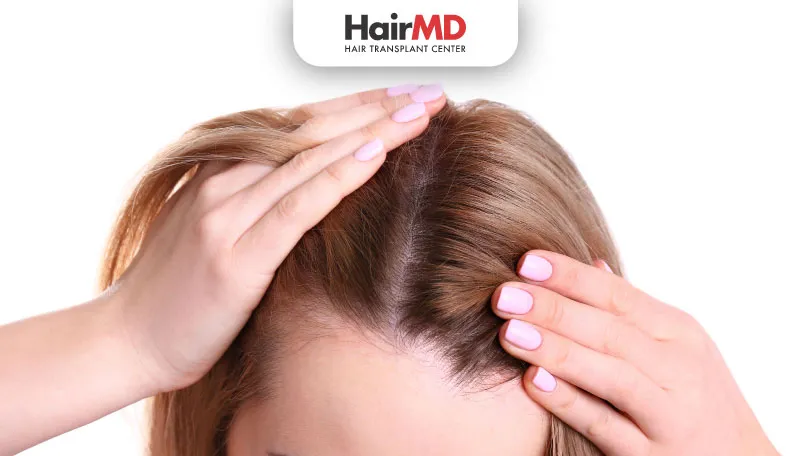1st April, 2022

Are aromatase inhibitors contributing to your hair loss? Discover how these medications, often used in cancer treatment, can impact hair health. Learn about the reasons behind hair thinning and strategies to manage and reduce hair loss during treatment
We have a special bond with our hair and take extra care of it. Sometimes the health of the hair gets compromised due to several factors. The factors may include genetics, hormonal imbalance, nutrient deficiencies due to improper diet, underlying medical conditions or their treatments.
Let’s find out the connection between aromatase inhibitors and hair loss.
What’s covered in the article?
- What are Aromatase Inhibitors?
- Do Aromatase Inhibitors Cause Hair Loss?
- Conclusion
What are Aromatase Inhibitors?
To find out the connection between aromatase inhibitors and hair loss, let’s first understand what aromatase inhibitors(AIs) are and what are they used for.
Aromatase inhibitors are a class of drugs used in the treatment of breast cancer. Postmenopausal women are often at a higher risk for breast cancer. It is also used for the treatment of men who suffer from gynecomastia which is an increase in the amount of breast gland tissue. These can be caused due to an imbalance of the hormones estrogen and testosterone. As, lower estrogen levels by blocking an enzyme in fat tissue (called aromatase) from changing other hormones into estrogen. These drugs are especially given to women who have already attained menopause and are suffering from breast cancer. The AIs therapy given to cancer patients leads to hair loss and hair thinning.
Do Aromatase Inhibitors Cause Hair Loss?
Aromatase inhibitors cause hair loss due to side effects as the estrogen concentration level is decreased. There are different types of Aromatase inhibitors, and each can have a different effect on the hair. Aromatase inhibitor, which is given to breast cancer survivor patients, causes hair thinning and not complete hair loss. A clinical study done on patients taking the drug showed that only about 3.4% – 6.2% of women reported hair loss of various degrees compared to other drugs.
As the estrogen level is connected with hair growth, reducing the estrogen level may lead to hair thinning in the initial year of the treatment. The hair grows back once the patient has stopped taking the medicines.
Hair thinning and, in some cases, hair loss experienced by breast cancer survivor patients can be due to other factors such as chemotherapy agents. Endocrine therapy-induced hair loss in association with AIs and tamoxifen treatment has been reported but is again not permanent. Complete hair loss due to any type of aromatase inhibitor has not yet been clinically proven. It is definitely associated with hair thinning, but it is not a permanent problem.
A good diet consisting of proteins, vitamin C, and omega-3 fatty acids can change the hair-thinning cycle. A good dermatologist can provide proper recommendations for achieving the healthy hair that you seek. The treatments totally depend on the diagnosis, as one treatment does not fit all.
Do You Know?
Nearly 250 Patients Visit HairMD
Everyday For Various Hair Concerns?
(Your journey to healthier and fuller hair starts here!)
Meet Our Dermatologists
Conclusion
If you are suffering from Aromatase inhibitor-induced drug hair loss, you may seek experts at HairMD. Our experts will guide you on aromatase inhibitors and hair loss connection and provide a customised plan for patients to resolve your hair loss problems. The treatment depends on the diagnosis, which will give a detailed understanding of the condition.
Further Reading
Rosemary Oil for Hair Growth: Benefits and Side Effects
Explore the benefits of rosemary oil for hair growth & learn about its potential side effects. Our guide covers how to use rosemary oil to promote healthy hair growth.
How Much Hair Loss is Normal for Teenage Male?
Understand normal hair loss in teenage males and when it may signal an issue. Visit HairMD Pune for expert advice on teenage hair health and treatment options.
Ultimate Food Guide For Healthy Hair
Struggling with hair fall? This Food For Healthy Hair guide shares easy diet tips to support stronger, healthier hair naturally.
How to remove scabs after Hair Transplant? | HairMD
The correct way to remove scabs after hair transplant without damaging grafts. Get expert-backed tips from HairMD Pune to support a smooth recovery.
Have thoughts? Please let us know
We are committed not only to treating you, but also educating you.











